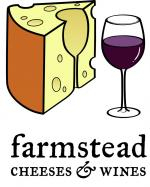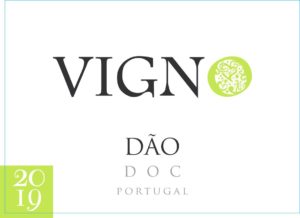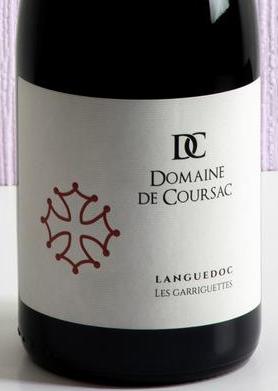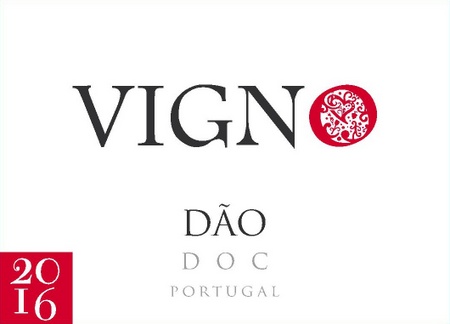freire lobo Vigno Dao Branco (Organic, Biodynamic)
Secateurs Chenin (organic, Biodynamic )
Penya Rosé (Sustainable)
Coursac Rouge Les Garriguettes (organic, biodynamic)
freire lobo Vigno Dao Tinto (Organic, biodynamic)
Allegria Tribu d’a (organic)
Vigno Dao Branco (Organic)
Elisa Freire Lobo began her winemaking career in 1996, working and studying in the Bairrada region at Caves São João and the following year in the Douro with Anselmo Mendes. Being that she grew up in the Dão region, the oldest non-liqueur DOC in Portugal, she decided to return to her roots where she quickly became the very first woman winemaker in the region. In the ensuing years, she went on to work with many of the most respected producers of the region, including Casimiro Gomes, Carlos Rodrigues, Carlos Lucas, Alvaro Castro and the late Magalhães Coelho.
Elisa’s family has been growing grapes in the Dão for decades, so the next logical step would be to take over the family vineyards, which she did in 2010. Immediately, she began the conversion to organic farming, in order to respect the soil, plants and biodiversity of the 35 acres that she began farming. Between November and February, the vineyards are grazed by Bordaleiras sheep, which are typical of the mountainous Serra da Estrela where these vineyards lie at an elevation between 1500 and 2500 feet above sea level.
The sheep help control grass growth during wet months as well as adding essential natural fertilizer to the vineyards. Grasses and legumes are planted and encouraged the rest of the year as cover crops that improve the soil structure, increase fertility and help better manage the nutrients and limited water available in this poor, granitic soil. The cover crops stimulate biodiversity in the soil and vineyards, an essential part of long-term vineyard management. Only traditional Portuguese varietals are planted.
Reds include Touriga Nacional, Alfrocheiro, Tinta Roriz, Jaen, Alvarelhão, Baga, Bastardo, Tinto Cão, Camarate and Rufete. Whites include Encruzado, Cerceal, Bical, Fernão Pires, Malvasia and Barcelo. These are all harvested manually and some of their vineyards include ancient field blends, planted to virtually all of the above named varietals. The traditional methods of the vineyards flow directly into the winery where all fermentations are spontaneous using only indigenous yeasts.
50% Encruzado, 35% Bical, and 15% Cerceal. Encruzado has got to be my favorite Portuguese white grape these days. It’s got great structure and mouthwatering acidity for extended ageability, but fleet of foot, bursting with citrus and stone fruit flavors. Lightly creamy, fun and refreshing, with a backbone of lemon zest, pine needle, green apple, and tangy minerality. Wet slate, pomelo, pear – goes with any type of seafood.
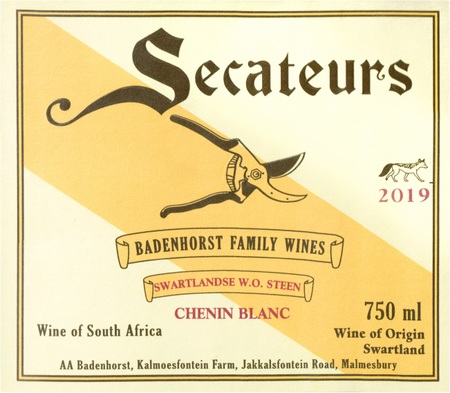
Secateurs Chenin (organic, natural)
South Africa knows a thing or two about dry Chenin Blanc, also known locally as Steen. The Badenhurst “Secateurs” is a beauty, with notes of stone fruits, minerality, and un petit peu of that dry Chenin, Bit-o-Honey goodness. A.A. Badenhorst Family wines is run by a couple of hippies, cousins, to be exact, who farm biodynamically and make wine naturally using old-school, traditional, no-frills equipment. Adi Badenhorst is quite a character. In addition to being a hot-stuff winemaker, he is also a parrot farmer, an LP collector, and a tea connoisseur.
The 2019 Secateurs, Badenhorst’s super-successful entry-level label, comes from 26 Swartland vineyards and is matured in a combination of concrete and foudres. The nose grabs you by the olfactory senses with pineapple, saffron and tangerine aromas. The palate is well balanced with a fine bead of acidity, nice focus and good weight on the simple but crisp lime and pineapple finish. Delicious and a great value to boot.

Penya Rosé (Sustainable)
Cases de Pene is a tiny village in the Roussillon region of Southern France, just 30 miles north of Spain. Ceded to France in the mid 17th century, the area is still known as “French Catalonia”. We celebrate this heritage with the Catalan spelling of the ancient Château and village Cooperative: “Penya”.
90% Grenache, 10% Syrah. Refreshing notes of Ranier cherries, garrigue, and hints of red raspberry and melon. Rich, full-bodied, yet bright on the palate. SERVE WITH Great as an aperitif or an accompaniment to hearty salads, fish and shellfish, charcuterie, frittata, and more.
Coursac Rouge Les Garriguettes (organic and biodynamic)
The Domaine de Coursac is located in the south of France, in the heart of the AOC Languedoc.The calcareous, gritty soil and an exceptionally sunny climate make the estate a privileged terroir, from which high-quality, fruity and spicy wines are produced.
Les Garriguettes- named for an exclusive wild strawberry grown in the Languedoc region and making up the primary aroma, elevated with the traditional “garrigue” notes of rosemary and thyme. The nose speaks of blackberries, macerated cherries and notes of coffee and chocolate. Fermented in egg-shaped cement tanks with a soft mouthfeel the wine is finished with a crispness. Taking its pointers from Chateauneuf-du-Pape winemakers and updating a classic with cement aging, this wine pairs perfectly with Mediterranean dishes, red meats, lamb, game birds, and tapenades.
50% Grenache Noir 30% Syrah 20% Cinsault
freire lobo Vigno Dao Tinto (Organic, Biodynamic)
Elisa Freire Lobo began her winemaking career in 1996, working and studying in the Bairrada region at Caves São João and the following year in the Douro with Anselmo Mendes. Being that she grew up in the Dão region, the oldest non-liqueur DOC in Portugal, she decided to return to her roots where she quickly became the very first woman winemaker in the region. In the ensuing years, she went on to work with many of the most respected producers of the region, including Casimiro Gomes, Carlos Rodrigues, Carlos Lucas, Alvaro Castro and the late Magalhães Coelho.
Elisa’s family has been growing grapes in the Dão for decades, so the next logical step would be to take over the family vineyards, which she did in 2010. Immediately, she began the conversion to organic farming, in order to respect the soil, plants and biodiversity of the 35 acres that she began farming. Between November and February, the vineyards are grazed by Bordaleiras sheep, which are typical of the mountainous Serra da Estrela where these vineyards lie at an elevation between 1500 and 2500 feet above sea level.
The sheep help control grass growth during wet months as well as adding essential natural fertilizer to the vineyards. Grasses and legumes are planted and encouraged the rest of the year as cover crops that improve the soil structure, increase fertility and help better manage the nutrients and limited water available in this poor, granitic soil. The cover crops stimulate biodiversity in the soil and vineyards, an essential part of long-term vineyard management. Only traditional Portuguese varietals are planted.
Reds include Touriga Nacional, Alfrocheiro, Tinta Roriz, Jaen, Alvarelhão, Baga, Bastardo, Tinto Cão, Camarate and Rufete. Whites include Encruzado, Cerceal, Bical, Fernão Pires, Malvasia and Barcelo. These are all harvested manually and some of their vineyards include ancient field blends, planted to virtually all of the above named varietals. The traditional methods of the vineyards flow directly into the winery where all fermentations are spontaneous using only indigenous yeasts.
90 points, Wine Enthusiast: Fermented in open top tanks with foot treading, the wine is dense and concentrated. It has a plummy character that gives an open texture and richness. Acidity and tannins at the end are now balanced and the wine is ready to drink.
40% Touriga Nacional, 30% Jaen (Mencia), and 30% Alfrocheiro.
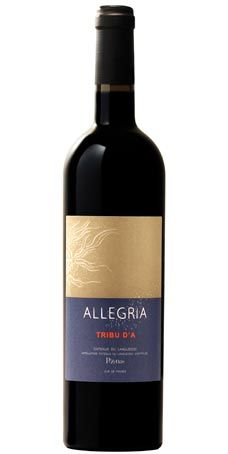 Allegria Tribu d’a (organic, natural)
Allegria Tribu d’a (organic, natural)
Ghislain and Delphine d’Aboville found paradise on the southern slope of Les Baumes, an extinct volcano overlooking the Haut Languedoc town of Pézenas. This windy site called out to them as ideally suited to the production of interesting wines and more importantly as a rural location perfect for raising their tight-knit family of seven. The couple partnered with friend and mentor Roberto de la Mota (of Cheval des Andes and Mendel fame) when purchasing the property, and Roberto continues to lend his wisdom with each vintage.
This is one of only three locations in France with a high proportion of basalt soil, the other two being the Grand Cru of Rangen in Alsace and Clermont Ferrand in Auvergne. The second primary component of the soil here is quartz river rock, a soil type made famous in Chateauneuf-du-Pape. The quartz here comes from the same source as that in Chateauneuf, but is jagged rather than rounded due to it not having traveled as far. One will find that the quartz here is also present much deeper, continuing underground for hundreds of feet and thus lending a searing minerality to wines grown here.
In total the property is comprised of 23 acres and divided into four vineyard blocks. Each vineyard block is used for one specific wine the family produces. All vines are certified organic and this was the region’s first winery principled on ecological design and process. SO2 additions are extremely limited (under 20 mg/L).
Grapes are fermented in unlined concrete vessels that were custom designed to accommodate manual pigeage, which still eight years in is a favorite after-school activity for all of their kids (they strap the kids into climbing harnesses that are roped to a bar overhead and let them go wild).
Sourced from low yielding 40 year old vines that sit on the highest elevation parcel of the property. A standout for those looking for a garrigue-driven Syrah/Mourvedre blend that shows way more focus, minerality, and tension than similar compositions grown in warmer, less rocky sites like the Southern Rhone.
“Tribu d’A” is short for “Tribe of d’Aboville” and the family’s nickname amongst friends, family, and neighbors.
80% Syrah, 20% Mourvedre Origin: France | Appellation: AOC Coteaux du Languedoc Pézenas Elaboration:Organic viticulture. 20% of the cuvee is matured in a combination of first, second, and third use Taransaud barrels, the remainder in neutral vessels. Winemaker: Ghislain d’Aboville and Roberto de la Mota
“Dark ruby red colour. Youthful nose showing some meaty, peppery and dark fruity hints. The palate offers sweet fruit, a fine spiciness, notes of crushed blackberry, pepper, tobacco and a long spicy finish, attractive with good drinkability.” – Andreas Larsson, Master Sommelier.

